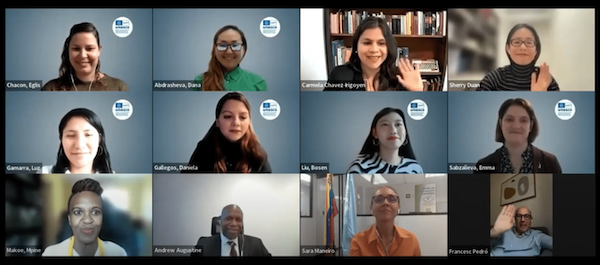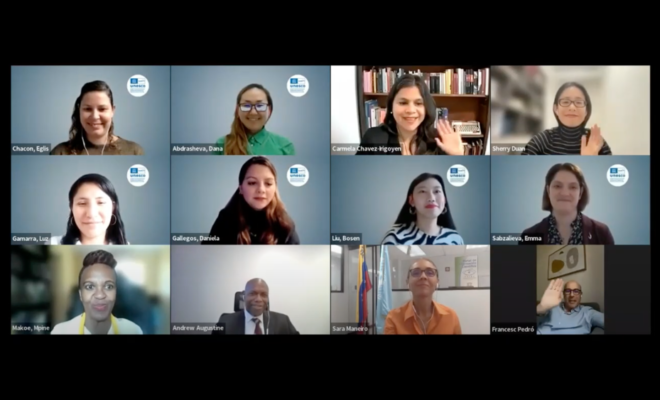“If we start acting now, in 2050 we could have equal access to technology and more critical citizens” / Ibercampus

“If we start acting now, in 2050 we could have equal access to technology and more critical citizens”. This is what Eglis Chacón, Luz Gamarra Caballero and Emma Sabzalieva, 3 members of UNESCO’s Research and Analysis Team at the International Institute for Higher Education in Latin America and the Caribbean (IESALC), authors of the latest reports following the Organization’s public consultations on the futures of education and higher education in the world, say in the following interview with Ibercampus.
In the above photo of the presentation event, Eglis Chacón appears 1st from left to right, Luz Gamarra Caballero 5th and Emma Sabzalieva 8th, although they all share the following answers to the questions that follow:
- To what extent does this latest UNESCO report Roads to 2050 and Beyond: Results of a Public Consultation on the Futures of Higher education overcome Ibercampus’ criticizm to its general report: weak overall consensus and no proposal for action plans the Preliminary General Report on Futures of Education?
The Futures of Education initiative is a global push to reimagine how knowledge and learning can shape the future of humanity and the planet. The main objective of this series of discussions has been to generate an agenda for global debate, research and action on the multiple futures of education, learning and knowledge in a world where increasing complexity, uncertainty and precariousness are advancing by leaps and bounds. Roads to 2050 and Beyond, like Reimagining Our Futures Together, is a multi-pathway map for futures education, reflecting distinct global roads and contexts that help us rethink what higher education will look like in the future.
Specifically, Roads to 2050 and Beyond, based on the responses of 1,200 people from 97 countries, presents six calls to action: i) defend the right to higher education; ii) address barriers that limit participation; iii) open access to knowledge in a more active way; iv) empower new generations; v) strive to make higher education more relevant; and vi) advocate becoming future thinkers to anticipate future challenges and motivate change now.
These calls invite the different actors, from higher education institutions, to civil society and policy makers, to reflect on where we are with respect to each of these calls, and on a key point of where we want to go in terms of higher education. This will allow us to work towards making these desirable futures into possible futures.
- How will and how should the innovation and education of 2030, 2040 and 2050 differ from today’s?
The Education Futures initiative focuses on 2050 – and beyond – to think about the long term. This is not intended to be a futuristic exercise to draw scenarios, but rather to identify promising roads to build policies and strategies that shape desirable futures. The 2030 agenda is already well defined through the Sustainable Development Goals. The relevance of this thinking lies in the importance of looking beyond to help people (whether experts in higher education or the general public), to reflect on the paths that we have already traveled, identify good and bad practices, correct and eliminate those that are not aligned with the pursuit of the common good; all of this in order to move towards more desirable futures.
However, the public consultation highlights the importance of the presence of technology on the road to 2050. In addition to the impact on society, respondents pointed to the use of technology in education and advances in research and technological innovation as key aspects to consider in the next 30 years; thus, participants expect technology to have more impact on research, the labor market, the development of new skills and institutional change, as well as on their own lives.
If we start taking action now, by 2050 we could have equal access to technology and more critical citizens who know how technology is used and for what purposes. With this in mind, 2030 and 2040 could be seen as milestones that bridge the gap to this vision.
- What skills and attitudes should we plant in people and machines in those decades? Will we be able to teach ethical values to Artificial Intelligence (AI) without granting them rights?
Based on the answers of the respondents, the Roads to 2050 and Beyond reveals the acquisition of life skills and responsible citizenship, connected to common values and principles, which implies a citizenship not limited by a nation-state, but linked to all people, cultivating a responsible and sustainable citizenship, inclined towards society, nature and well-being.
Developments in AI have helped us to produce remarkable results in various fields. However, such technological advances have also brought significant challenges, calling into question gender biases or significant threats against privacy or mass surveillance. In the public consultation, respondents highlighted the importance of AI and big data as examples of technology that can provide valuable information for decision-making at all levels of education. Although people expect technological advances to continue, AI was highlighted as a concern, which is an acknowledgement of uncertainties about the implications it could have on people’s lives.
It is important to add that, in November 2021, UNESCO presented the first global standard on the ethics of AI, adopted by UNESCO Member States at the General Conference. Faced with the omnipresence of AI, this document sets out the common values and principles that guide the construction of the legal infrastructure necessary to ensure a healthy development of AI. It proposes a series of recommendations to maximize the advantages of AI and reduce its risks: i) greater transparency in terms of data management and protection; ii) prohibition of the use of social markers and mass surveillance; laying the groundwork for iii) monitoring and evaluating the ethical impact of developments; while iv) preserving iv) the protection of the environment in terms of data, energy and resources to contribute to the fight against climate change.
- What should we, as teachers and researchers, do to improve the governance and sustainability of higher education institutions?
Based on the public consultation, with 84% of participants linked to higher education where 47% are professors, researchers and/or academic staff in higher education, respondents demand “inclusion with quality” stating that better access to higher education and greater equity in futures go hand in hand with improving quality. That is why they stress the need to provide high-level educational experiences and support services to prepare students for future realities.
Study participants provided examples of how quality could be improved by aligning courses to identified quality assurance standards that are relevant to and defined by national, regional, and/or international qualification frameworks for higher education credentials.
The call to teachers and researchers from the respondents is that quality also means that teaching and learning models are kept up to date and are able to manage the constant dynamic changes generated by societies and globalization processes. Respondents to the public consultation visualize professors with greater freedom to choose the way courses are taught, without forgetting the importance of student opinions and contributions. This vision is complemented by a more holistic faculty development, supporting teacher training through curiosity, values, research, proactivity, taking into account a multicultural world that connects with other cultures and beliefs to place sustainable learning as a transversal value.
Regarding the sustainability of higher education institutions, Roads to 2050 and Beyond highlights the knowledge organization, where “learning is everywhere”; and, for respondents, this translates into the need to deploy multiple modalities to ensure that learning can also occur at any time. Even as a principle for digitized higher education, higher education must deliver what is needed, regardless of whether it is delivered online or offline and whether it is a formal degree program or informal learning.
- How can education reduce the inequalities in the world and make this a basis for achieving the SDG targets?
One of the main concerns reflected in the public consultation when thinking about 2050, is the inequality in the world, both from an individual perspective that fears a low quality of life, mainly due to the impact of climate change that may increase inequalities and deteriorate human well-being; and at the collective level in relation to social change where inequalities are linked to concerns about inequity and lack of social justice. There is also a profound fear that in 2050 social gaps and inequalities, discrimination, polarization, asymmetries and wider differences based on ethnicity will not only persist, but deepen.
In the face of this, some calls to action for higher education that the study presents are: i) Defend the right to higher education, the majority of respondents expect higher education to continue to play an important role in the societies and communities of the future. Many even suggested that this role be expanded as higher education becomes more relevant to the multiple futures ahead; and, that the trust placed in higher education be widely disseminated, whether in the formation of responsible citizens, as a source of reliable information, or as a generator of important new knowledge.
- ii) Addressing barriers that limit participation. Considering previously that all levels of education are recognized as a universal right, the public consultation points out that access to higher education must be expanded, so it is necessary to understand and remove barriers that limit participation, with efforts on many fronts, from research to advocacy and policy change. It is not only geared towards letting more people into this education, but in supporting students to develop their individual capacities and finding ways to organize such education by meeting all the different needs.
- What expectations do you have regarding the participation and engagement of civil and global society in solving today’s sustainability problems?
Based on the public consultation, youth leadership is envisioned as an important hope for 2050 futures. The expectation incorporates the youth population and new generations in the issues that affect them, achieving a level of social engagement that improves their social, economic and political context. Also, respondents expect people to show greater integrity in the future, acting with honesty and standing up for their principles, while focusing on an integrated and more caring society.
In addition, they aspire for higher education to be student-centered by 2050; and, they emphasize the role of higher education in developing people’s competencies. In the context of a global vision, respondents’ suggestions focused on the ways in which higher education can cultivate responsible and sustainable citizenship; and, on its role in fostering exchanges and removing barriers in order to facilitate them. That is why some calls to action to achieve these futures are: i) empowering the next generations and ii) striving to make higher education more relevant.
UNESCO IESALC has just begun a youth consultation which is another way to understand the expectations of this group as part of civil society. Youth voices are often neglected in decision making, even in the public consultation less than 20% participated; and, if knowledge, perceptions and hopes are imposed on our future generations, will they really believe that they can create their own future? This way, the third phase of the Higher Education Futures project sends a clear signal to young people that their future is in their hands.
RELATED ITEMS







